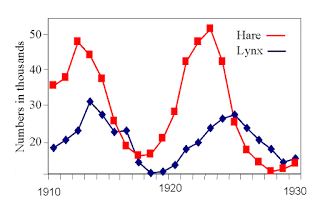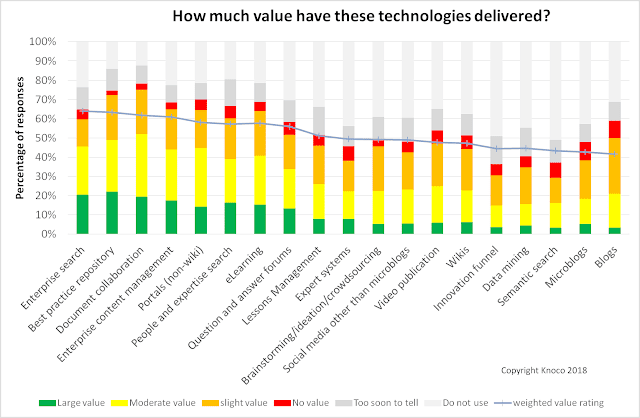Nick Milton
-
Nick Milton wrote a new post on the site CYBERCASEMANAGER ENTERPRISES 6 years ago
In a 2015 video reprise from Edward Rogers, CKO of NASA Goddard, he explains what he sees as the 5 most common mistakes in implementing KM. All of these stem from one reason, which is that KM people too often fail […]
-
Nick Milton wrote a new post on the site CYBERCASEMANAGER ENTERPRISES 6 years ago
The best definition of a Knowledge Worker is “someone who knows (or learns) more about their job than their boss does”. So how does this work in a hierarchy?Percentage of people in each country who agreed with […]

-
Nick Milton wrote a new post on the site CYBERCASEMANAGER ENTERPRISES 6 years ago
People often ask us “how do we incentivise knowledge sharing?” I often answer “don’t bother. Incentivise knowledge seeking and re-use instead”.I give this answer, because knowledge sharing in itself achieves […]

-
Nick Milton wrote a new post on the site CYBERCASEMANAGER ENTERPRISES 6 years ago
We all know that trust is a key factor in the success of Knowledge Management, but trust in what, and how do we build that trust?Image from wikimedia commonsTrusting a Knowledge Management Framework is like t […]

-
Nick Milton wrote a new post on the site CYBERCASEMANAGER ENTERPRISES 6 years ago
How do you measure the performance of your Knowledge Management team? What sort of KPIs should you choose? Image from wikipediaThe answer to this question depends on the stage that KM implementation has reached. […]

-
Nick Milton wrote a new post on the site CYBERCASEMANAGER ENTERPRISES 6 years ago
One of my favourite common-sense KM articles of all time is Tom Davenport’s 1997 article on the 7 deadly syndromes of Knowledge Management – still as relevant today as it ever was. Dating from the earliest days o […]
-
Nick Milton wrote a new post on the site CYBERCASEMANAGER ENTERPRISES 6 years ago
An effective Knowledge management communication message needs to appeal to the head, to the heart, to the hands, and to the feet of the audience. Here’s how.Communication is one of the 5 tools of KM culture […]

-
Nick Milton wrote a new post on the site CYBERCASEMANAGER ENTERPRISES 6 years ago
5 years ago, in late 2014, I made an estimate of the number of knowledge managers in the world. Here is an update – the number has increased to over 47,500, of which 28% are in the USA.Number of knowledge […]

-
Nick Milton wrote a new post on the site CYBERCASEMANAGER ENTERPRISES 6 years ago
Knowledge Management often involves balancing two forces – Connect and Collect, for example, or value to the individual and value to the firm. If you are not careful, this balance can turn into pendulum swings […]

-
Nick Milton wrote a new post on the site CYBERCASEMANAGER ENTERPRISES 6 years ago
Here are some more results from our 2014 and 2017 Global Survey of Knowledge management; a plot of KM Technology usage and value.We asked the survey participants to rate a range of different types of technology by […]

-
Nick Milton wrote a new post on the site CYBERCASEMANAGER ENTERPRISES 6 years ago
Say what you like about the ISO KM standard; at least it encourages you to address KM in the correct order!There are many approaches adopted for introducing KM, and not all of them work well. For example the […]

-
Nick Milton wrote a new post on the site CYBERCASEMANAGER ENTERPRISES 6 years ago
There’s nothing magic about Knowledge management; it’s just a management discipline, like so many others.I would suggest that Knowledge Management is one management discipline among many.It represents a way of […]

-
Nick Milton wrote a new post on the site CYBERCASEMANAGER ENTERPRISES 6 years, 1 month ago
This blog is taking an end-year break. Happy Holidays to all my readers; normal service will be resumed in January.

-
Nick Milton wrote a new post on the site CYBERCASEMANAGER ENTERPRISES 6 years, 1 month ago
Knowledge has to lead to action in order to add value. call to action by Sean MacEntee on FlickrAs the blogger Bill Wilson says (in the context of root cause analysis) “Learning without action is mere mental tri […]
-
Nick Milton wrote a new post on the site CYBERCASEMANAGER ENTERPRISES 6 years, 1 month ago
Work has its own rhythms; its own heartbeat. Make KM part of that heartbeat. Image from wikimedia commonsWork has cycles and rhythms; an organisational heartbeat if you will. Embedding Knowledge Management means […]

-
Nick Milton wrote a new post on the site CYBERCASEMANAGER ENTERPRISES 6 years, 1 month ago
The purpose of a Knowledge Management framework within an organisation is to give people timely access to the knowledge they need, to make effective decisions and take effective action. A conversation by Khalid […]
-
Nick Milton wrote a new post on the site CYBERCASEMANAGER ENTERPRISES 6 years, 1 month ago
There are 3 unusual cases where content is not important to KM, but they are rare!Image from wikimedia commonsThis blog has argued that content is as important as conversation in KM, and that content beats m […]

-
Nick Milton wrote a new post on the site CYBERCASEMANAGER ENTERPRISES 6 years, 1 month ago
There are 3 unusual cases where conversation is not important to KM, but they are rare!Conversation, by Valery Kenski, on FlickrThis blog has often argued that conversation is as important as content in KM, […]

-
Nick Milton wrote a new post on the site CYBERCASEMANAGER ENTERPRISES 6 years, 1 month ago
Just doing KM well is not enough, you have to do KM at the required speed. Public domain image from PixnioThe world is changing, and organisations need to learn faster than the speed of change if they are to […]

-
Nick Milton wrote a new post on the site CYBERCASEMANAGER ENTERPRISES 6 years, 1 month ago
In a project-based organisation, we can look at Knowledge Management on two orthogonal axes which together map out the space within which knowledge flows. These are the in-project axis and the cross-project […]

- Load More
















